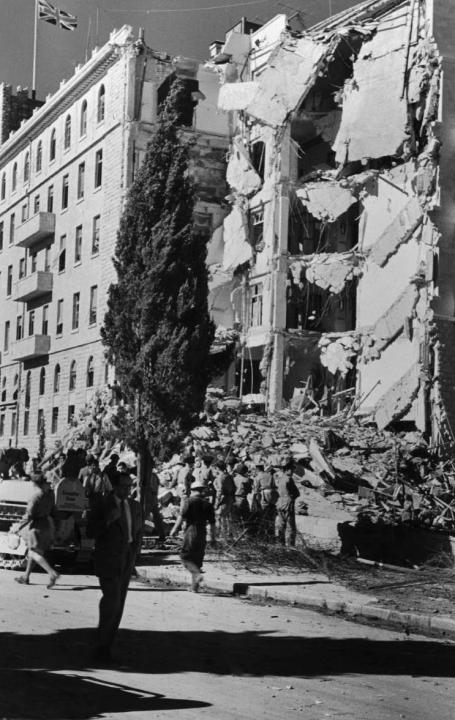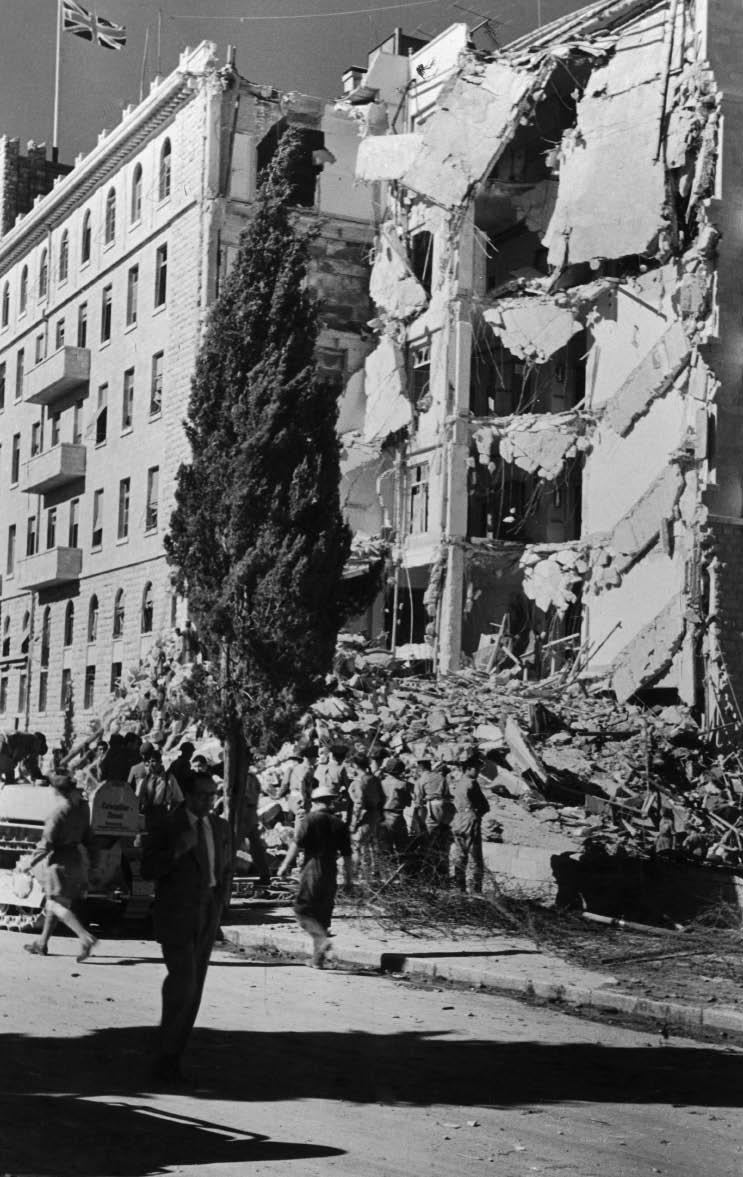A Senseless, Squalid War: Voices from Palestine 1945-1948, by Norman Rose
Major Farran’s Hat: Murder, Scandal and Britain’s War Against Jewish Terrorism, 1945-1948, by David Cesarani
The second epigraph in Norman Rose’s eloquent, comprehensive and even-handed book, A Senseless, Squalid War, says it all, from Palestine in the late 19th century to Gaza right now. In 1891, the Zionist philosopher and poet Asher Zvi Ginsberg, wrote:
From abroad we are accustomed to believing that the Arabs are all desert savages, like donkeys. But this is a big mistake. The Arabs, and especially those in the cities, understand our deeds and our desires in Eretz-Israel. If the time comes when the life of our people in Eretz-Israel develops to the point of encroaching upon the native population, they will not yield easily their place.
When Ginsberg wrote that, the Jewish population of Palestine was at most 34,000; there were upwards of 600,000 Arabs. On the eve of the first world war, writes Rose, a professor at the Hebrew University, Arabs were complaining that Zionists were aiming for a state within a state, including a flag and an anthem; they accused the Jews of dispossessing them from Arab lands, expanding Jewish settlements, and creating a bank and and a separate educational system. By 1922, two years after the establishment of the British mandate, there were 660,641 Arabs and 83,790 Jews in Palestine, and only six years later there were 151,656 Jews. The Yishuv, the Jewish community, despite the lack of interest amongst Jews worldwide, who preferred America as a destination, had created Jewish ministries, trades unions, what Rose terms ‘progessive educational and health systems,’ and the Philharmonic Orchestra. Britain saw nothing out of the way in these developments, which saved money for the British taxpayer.
At worst, in those pre-war years, the British thought of the Jews as ‘uppity and argumentative,’ while both the primarily agricultural Arabs and the European or Europeanised Jews regarded each other with suspicion and resentment, but reserved much of their animosity for the British. This was ‘a vicious circle indeed, and a sure recipe for outbreaks of violence,’ in one of Rose’s typically vivid phrases. In the late Thirties, under the benign rule of General Sir Arthur Grenfell Wauchope, a traditional Scot who ate his porridge standing, Jewish immigration accelerated, as did Arab anger. The armed wing of Hamas bears the name of the militant Syrian-born Palestinian leader al-Qassam, and the first serious Arab riots, initially killing nine Jews, broke out.
The British increased their military presence and briefly, oddly in retrospect, co-operated with the Yishuv’s armed force, the Haganah. This idea came from Captain, later General, Orde Wingate, the probably loopy British officer who established the Special Night Squads. Haganah volunteers, one of whom was Moshe Dayan, were commanded by British officers. Forty per cent of the British army, bolstering British strategy for the Middle East, was, Rose notes, ‘tied down’ in Palestine. In acts not unfamiliar in the West Bank today, British forces ‘routinely’ blew up Arab villages suspected of being involved in terror and drove a bus loaded with villagers ‘backwards and forwards over mined roads, ostensibly to teach them a lesson.’
In this period, too, 265 British servicemen were killed, and 495 Jews. Two Jewish terrorist groups, Irgun Zvai Leumi and LEHI, the Stern gang, set about blowing up and shooting British soldiers and officials. Against them the British employed the counter-terror masterfully detailed in Major Farran’s Hat. One Arab leader, Haj Amin, the Mufti of Jerusalem, attempted to treat with Hitler, who received and rather liked him, as a bit of an Aryan. Haj Amin was to recruit Balkan and Soviet Muslims into the Waffen SS. But his attempts to throw in with the Nazis, beginning in 1936, failed. In 1942 Avraham Stern, whose unsuccessful flirtation with the Nazis is almost incredible, was gunned down by the British ‘in what amounted to a summary execution’. In 1944, two Stern-gang operatives in Cairo assassinated Lord Moyne, Minister Resident for the British in the Middle East, thus at a stroke weakening Winston Churchill’s sympathy and support for the Zionist cause. He was to bracket Zionism with ‘this new set of gangsters worthy of Nazi Germany’. In 1946 the British sprang Operation Agatha, which interned 2,700 Jewish terrorist-suspects and uncovered many weapons. The embattled Jews called the English soldiers ‘Gestapo’ and shouted ‘Heil Hitler’, and the soldiers responded with graffiti (another shade of Gaza): ‘What we need are gas chambers.’
Chaim Weizmann, one of the greatest Jewish leaders and an unfailing moderate, observed that ‘Palestine today is not merely a police state; it is the worst form of military dictatorship.’ The Irgun waited for a target, and on 22 July, 1946, blew up a wing of the King David Hotel, killing 28 British, 41 Arabs, 17 Jews, and five others. A moderate Arab intellectual leader termed this ‘a Holocaust’. In further activities suggestive of the Gaza to come, the British uncovered terrorist arms caches in a school and in Tel Aviv’s Great Synagogue.
What especially enraged the British, as is true in many counter-insurgencies, was that much of the Jewish population sympathised with the terrorists. ‘The Arabs,’ Rose writes, ‘at this stage did remain remarkably passive’. Their national movement, he repeatedly emphasises, ‘lacked cohesion.’ And in America, again a prefigurement of enthusiasm for Israeli policies in Lebanon and Gaza, Zionists like the playwright Ben Hecht, who wrote the ‘unabashed [Zionist] melodrama’ A Flag is Born, starring the young Marlon Brando, praised the terrorism. In a Letter to the Terrorists of Palestine Hecht wrote:
The Jews of America are for you. You are their champions. Every time you let go with your guns and bombs at British betrayers and invaders of your homeland, the Jews of America make a little holiday in their hearts.
(There are some very funny passages in this book about the collusion between Zionists, the Mafia and Frank Sinatra, to subvert the embargo on arms for the Zionist resistance.)
Of course it had to end. India was gone, Britain was poor and deeply in hock to the US; British soldiers were being blown up and hanged by the Irgun and the Stern Gang, with the approval of many Jews in Palestine and in the US. So the Mandate folded, the Jewish State was proclaimed, the British went home, and soon there would be an Arab-Israeli war. Now began what Palestinians called the Nakba, the Catastrophe, causing perhaps 360,000 to flee and many others to enlist in the resistance. What happened next, it seems to me (no expert), is best explained by Professor Benny Morris, quoted by Norman Rose near the end of his truly excellent book:
The Palestinian refugee problem was born of war, not by design, Jewish or Arab. It was largely a by-product of Arab and Jewish fears and of the protracted, bitter fighting that characterised the first Arab-Israeli war; in smaller part it was the deliberate creation of Jewish and Arab military commanders and politicians.
Rose’s footnotes run to 22 densely printed pages. Even so, he has not included what was in its way the most senseless and squalid episode during the post-war Mandate: the abduction, torture, and murder in May 1947 of Alexander Rubowitz, age 16. Like many young Jews, he ran errands for the Stern Gang, sometimes putting up anti-British posters. Like many zealots since, he looked forward, in so many words, to death and salvation.
The team that abducted him was led by Major Roy Farran, a Boys’ Own war hero, good-looking, daring, irresponsible and very dangerous. It was Farran who bashed in Rubowitz’s head, stabbed him many times, and fixed it so that his body was never found. The next day he confessed what he had done to his superior officer, Lt. Colonel Bernard Fergusson, who had taught him at Sandhurst, and recruited him for work in Palestine.
Farran ran away, came back and was court-martialled. The trial was a total cover-up, although by now most Jews and many international reporters knew what had happened. Farran had left his hat with his name in it at the scene of the abduction. That mistake, and the testimony of some eye-witnesses, led to his almost immediate identification as the abductor of Rubowitz. The case became an international scandal; the world press pored over it, and Clement Attlee helped manage the cover-up. After his disgraceful exoneration, Farran left the army, and eventually rose to high office in Canada. Fergusson, who had lied for him under oath, became Baron Ballantrae and Governor General of New Zealand. Jewish assassins in London, burning for revenge, blew up Farran’s innocent brother, Rex, because the killers went to the wrong address, seeking a Farran whose first name began with R.
David Cesarani, Research Professor at the University of London, and the author of books on Adolph Eichmann, Arthur Koestler and Nazi war criminals in Britain, has now combined the excitement of a thriller with the use of hitherto unexamined sources. He argues that
the facts laid out here challenge the widely held belief that Britain surrendered its empire gracefully and with dignity. The conflict between the British and the Jews in Palestine created a poisonous legacy which infected the British response to subsequent anti-colonial movements that imposed a threat to colonial rule.
In particular, he argues further, ‘Britain’s decision to hand Palestine to the United Nations was a direct result of the failure of its counter-insurgency campaign.’
But the techniques practised by Farran, in the environment to which Chaim Weizmann drew attention when he spoke of Britain’s police state in Palestine, and Orde Wingate had pioneered, were used again in Malaya and Kenya, creating the same legacy of hatred. Cesarani’s meticulous investigation of ‘counter-gang’ and ‘pseudo-gang’ techniques leads to this great conclusion:
Wherever the form was employed it resulted in illegality, extra-judicial execution (that is to say murder) and scandal. The toxic legacy of the special squads contaminated British colonial policy for decades.
On the 26 February, The Times carried a story about ‘death squads’ inside the Kenyan army. Accused of murder, torture and abduction, they were trained in ‘counter-terrorism by Britain’. The reporter who led the investigation of this scandal has just been assassinated.







Comments